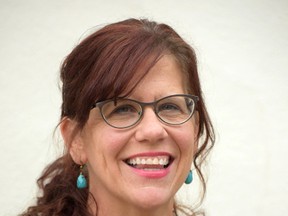Happy Healthy YOU

Article content
Kelly Spencer - Happy Healthy YOU
(A wellness column by Kelly Spencer: writer, life coach, yoga & meditation teacher, holistic healer and a mindful life enthusiast!)
Divorce at best, is a difficult time. For most, it is a life game changer and for better or worse, you are not the same person you were when you come out of it.
Dreams and hopes mutated to hurt and anger leaving a trail of repercussions. But long after the healing, remarriages and new starts, the child of divorce packs and carries the emotional suitcase of this experience taking it into their adult lives and more precisely into their love lives.
They have witnessed and whole heartedly felt heartache caused by “romantic” love which has created a paradoxical affect when it comes to partnerships in their own lives.
I had the opportunity to speak with some adult children of divorce and hear them share their love life experiences. Despite their varying levels of dysfunction within the divorcing years of their childhood, there is a related analogous theme and associated link among them... the way they love is different.
Here are a few of the experiences that were commonly expressed:
Talk is cheap: Words are just words. Talk must be followed up with the walking the walk. “I miss you. I love you." Don’t mean anything without follow-up. Having been told one thing but experiencing the opposite leaves you not trusting what people say sometimes. Childhood broken-promises require adulthood concrete action.
Over-empathy: “Having been hurt so much by my parent’s divorce, I feel a great empathy when other people hurt. I want to help them." Sometimes this empathy can be so predominant and codependent that it supersedes their own happiness allowing them to be mistreated while trying to help others feel better.
First date detectives: While on first dates, and although appearing cool and fun, the child of divorce is observing their potential partner’s every move on seeking out any red flags, deal breakers and undesirable flaws. There is usually lots of questions and inquiries as knowledge is power.
Enduring Reassurance: After the initial dating period, acts of love, questions of love and validation needs to be ongoing. Because of the lack of permanence shown in past, the child of divorce will need to be assured that everything is still on track, perhaps on an ongoing basis.
Armored Suit: There is a strong protective armor around their hearts. “I have a tendency for a quick tap out of a relationship at the first sign of an undesirable trait.” Cautiously not allowing anyone beyond the protective warrior layer.
Analytical Strategic Planning: The fear of the uncontrollable and unknown is atoned with a highly driven and focused unapologetic independence and organization. “I have a 35 year plan.” The controlled plans compensate for any feelings of lack of control.
Plan B: In the beginning stages of relationships, despite a perfect flow and connection, a “what if it doesn’t work” plan is often in place. This assists them to prepare the heart for a plan B to avoid the heartache they once felt. “It allows me to make it a logical knowing and plan and disassociate from the hurt feelings that may be involved.”
Mirror their desires: They want you to show them love and they will mirror this well. They are kind, thoughtful and giving and would do anything for anyone to make them feel important and loved. Cute morning texts. Letting you know they are thinking about you. Small gifts of affection. They will perfectly mirror their own desires.
Worst Fear: As strong and independent as they often appear, they want love so much, at times making them clingy. But trumping that desire of love is their fear of abandonment. “I keep people at a distance, to avoid eventual abandonment. It feels in some way like an inevitable outcome.”
Fascination of Normal: There is something intriguing and exciting for them when they encounter “normal families.” The idea and image of the emotionally stable family is fascinating.
Sky-high expectations: Having lived through difficult and sometimes volatile situations, they know as adults there must have been a better way. “Being raised by a single mom who inspired us to problem solve and attain our goals, there are very high expectations on people.” There is an expectation to find easy solutions in their life and in their relationships.
Communication is key: Discussing and communicating thoughts, feelings, and expectations are very valuable and expected. They are very aware of the underlying feelings with words of “I’m fine” and would dig deeper. They would rather hear the truth even it were painful to hear, than be lied to.
Cautious disbelief: “It is difficult to believe that relationships can last.” Even in an existing happy relationship the possibility of it lasting forever seems difficult for them at times. “My heart wants to believe and wants the white picket fence but my head tells me that it’s probable not real.”
Still believe: Despite their life experiences, they believe with all their heart that love is real and that marriage is a commitment that they want in the future.
Much like the paradox of love and hate they witnessed as children, the adult child of a broken family brings the paradoxical love with them into the future, at times, they are entangled in black and white thinking. There is a duality of cynicism and optimism that coexist together while the mixed feelings and messages they give off are ultimately yearning normalcy and love, just like each and every one of us.
(If you would like to see an article on a specific topic, please email kelly@indigolounge.ca)